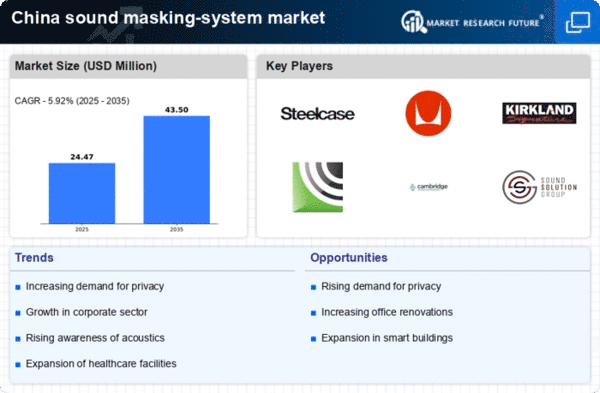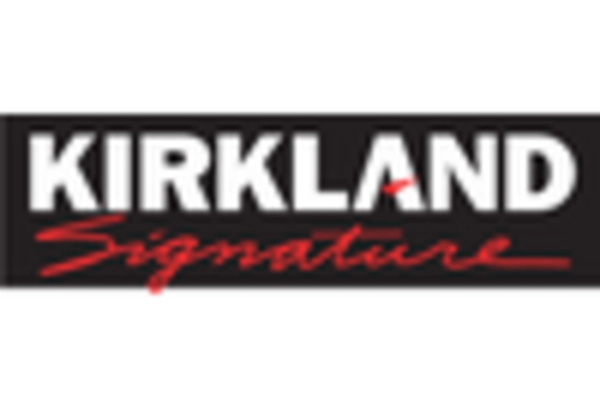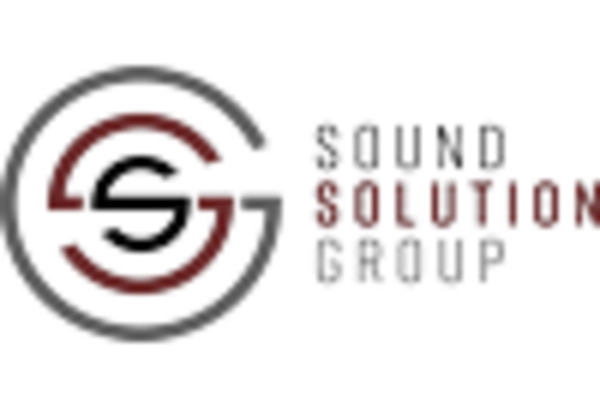Increasing Urbanization
The rapid urbanization in China is driving the demand for sound masking systems. As cities expand and populations grow, the need for effective noise control in commercial and residential spaces becomes paramount. Urban environments are often characterized by high noise levels, which can lead to decreased productivity and increased stress among occupants. The sound masking-system market is likely to benefit from this trend, as businesses and property developers seek solutions to enhance acoustic comfort. According to recent data, urban areas in China are projected to account for over 60% of the population by 2030, indicating a substantial market opportunity for sound masking systems to mitigate noise pollution in densely populated regions.
Growth of the Hospitality Sector
The hospitality sector in China is experiencing robust growth, which is significantly influencing the sound masking-system market. As the number of hotels, restaurants, and entertainment venues increases, so does the need for effective noise management solutions. Sound masking systems are being recognized as essential tools for enhancing guest experiences by providing a more pleasant auditory environment. The market for sound masking systems is likely to expand as hospitality businesses seek to differentiate themselves through superior acoustic comfort. With projections indicating a continued rise in domestic and international tourism, the demand for sound masking solutions in this sector is expected to grow, presenting substantial opportunities for market players.
Rising Awareness of Workplace Wellness
There is a growing recognition of the importance of workplace wellness in China, which is influencing the sound masking-system market. Companies are increasingly investing in employee well-being, understanding that a conducive work environment can enhance productivity and job satisfaction. Sound masking systems are seen as a viable solution to reduce distractions and improve focus in open office layouts. Recent studies suggest that implementing sound masking can lead to a 10-15% increase in employee productivity. As organizations prioritize mental health and comfort, the demand for sound masking solutions is expected to rise, positioning the market for significant growth.
Government Initiatives for Noise Control
The Chinese government has been implementing various initiatives aimed at noise control and environmental protection, which positively impacts the sound masking-system market. Regulations aimed at reducing noise pollution in urban areas are becoming more stringent, prompting businesses to adopt sound masking solutions to comply with these standards. The government’s focus on creating quieter environments in public spaces and workplaces is likely to drive demand for sound masking systems. Recent policies indicate a commitment to improving urban living conditions, which may lead to increased investments in acoustic solutions. This regulatory support is expected to create a favorable environment for the growth of the sound masking-system market.
Technological Integration in Office Spaces
The integration of advanced technologies in office environments is reshaping the sound masking-system market in China. With the rise of smart buildings and IoT (Internet of Things) applications, sound masking systems are being incorporated into comprehensive building management systems. This integration allows for real-time adjustments to sound levels based on occupancy and activity, enhancing user experience. The market is witnessing innovations that combine sound masking with other acoustic solutions, creating a more holistic approach to noise management. As businesses seek to modernize their facilities, the demand for technologically advanced sound masking systems is likely to increase, reflecting a shift towards smarter, more efficient workspaces.
















